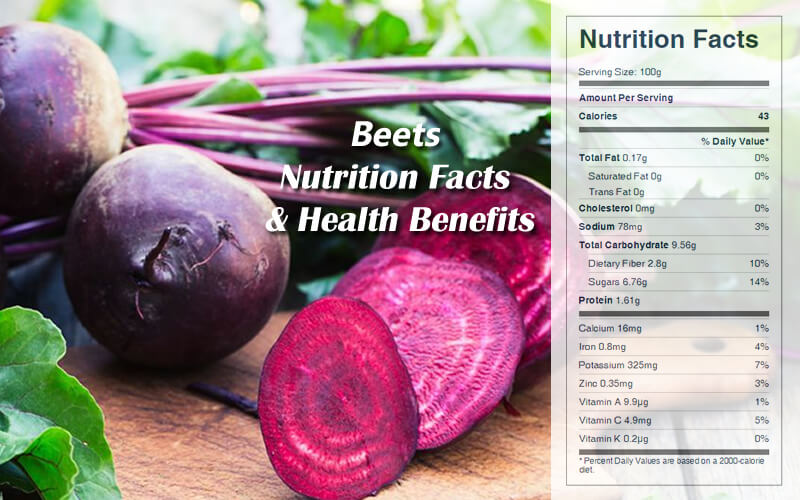Beets Nutrition Facts & Health Benefits
Both the roots and the leaves of the beet are used for food. The deep red roots contain anthocyanins, which are powerful antioxidants. Here are the nutrition facts and health benefits of beetroot.
Beets provide the minerals phosphorus, sodium, magnesium, calcium, iron, and potassium, along with vitamins A and C, and the B vitamins folic acid, niacin, and biotin. They are rich in fiber, and although a half-cup serving of cooked beets contains more carbohydrates than most vegetables, their unique benefits make them a powerful superfood.
Beet greens are in some ways even more nutritious than the root. A half cup of cooked beet greens has fewer carbohydrates, more protein, more fiber, more vitamins A and C, and more potassium, calcium, iron, magnesium, and manganese than the beet root, and only about half its calories. What beet greens lack is the red pigment that may be the beet root’s magic ingredient.

Raw beetroot is 88% water, 10% carbohydrates, 2% protein, and less than 1% fat.
Beets Nutrition Facts Label
Health Benefits of Beets
In the traditional medicine of central Europe, beets have a long history of use in the treatment of cancer: they seem to contain anticarcinogens bound to the red coloring matter, as well as possess a striking ability to increase cellular uptake of oxygen. Many of these actions are enhanced when beets are eaten raw or drunk as juice.
The antioxidants identified in beetroot are well absorbed in humans. Betalains are high in antioxidant potential and anti-inflammatory capabilities. Beetroot is a natural nitric oxide donor that has the nutritional potential to restore and maintain our blood vessels.
Beetroot is a rich source of phytochemicals, including ascorbic acid, carotenoids, phenolic acids, and flavonoids. But let’s focus on betalains and what makes them so special. The antioxidants in the betalain pigments, primarily betanin, have been shown to protect our cells against oxidative damage. Now, couple that with the presence of epicatechin, rutin, and caffeic acid, and you can get an idea of the abundant antioxidant potential of beets!
There is so much more to beets than what they contribute to your salad. Having grown so much in popularity, beets bring incredible health benefits. Beetroot stands out compared to other roots because of its bioactive pigment betalains and its source of dietary nitrate.
A study found that drinking beet juice lowered blood pressure, and researchers theorized that this was because of the nitrates in beets. However, beetroot juice modestly reduced systolic blood pressure but not diastolic blood pressure. This finding seems somewhat ironic, because nitrites and nitrates have long been suspected of creating carcinogenic nitrosamines in the stomach’s acid environment. But nitrates and nitrites are also involved in a cycle that produces nitrous oxide, which relaxes blood vessels and lowers blood pressure.
Nitrate in beetroot is metabolized to nitrite, and that is further reduced by our body to produce nitric oxide. Nitric oxide plays a critical role in maintaining heart health by reducing inflammation and improving endothelial dysfunction. The endothelium plays an important role in maintaining our blood vessels that supply blood to the rest of our organs, and because nitric oxide plays a critical role in mediating its function, depletion of nitric oxide has deleterious effects on our cardiovascular system.
Beet juice appears to help protect the integrity of cells lining the stomach and digestive tract. Thus, it may benefit people taking aspirin and other non-steroidal anti-inflammatory drugs, which are known to damage these cells. For the same reason, it may also help reduce adverse reactions to chemotherapy.
Health Risk
The red colour compound betanin is not broken down in the body, and in higher concentrations may temporarily cause urine or stools to assume a reddish color, in the case of urine a condition called beeturia. Although harmless, this effect may cause initial concern due to the visual similarity to what appears to be blood in the stool, hematochezia (blood passing through the anus, usually in or with stool) or hematuria (blood in the urine).
Nitrosamine formation in beetroot juice can reliably be prevented by adding ascorbic acid.
Storage
Small beets are usually less tough than large ones. Choose beets that are smooth, without obvious dents or bruises, and with a rich, dark color. If they should have at least a couple of inches of greens left on them, if you are going to eat the greens, choose small leaves, less than six inches or so in length.
Beets will last for two to three weeks in the refrigerator. Cut the leaves and stems away so they don’t continue to feed on the roots. If you plan to eat the greens, store them separately in a plastic bag in the refrigerator. Don’t wash beets until you are ready to cook them.
Beets don’t freeze well (the texture gets strange), and canned beets lose some of their protective nutrients in the heat of cooking, so this is a vegetable that is far better fresh.
To prepare beets, wash them carefully without breaking the skin. They can be steamed, baked, or roasted. Regardless of the cooking method used, let cooked beets cool enough to handle and remove the skins before serving (skins can be left on if beets are very young and fresh).